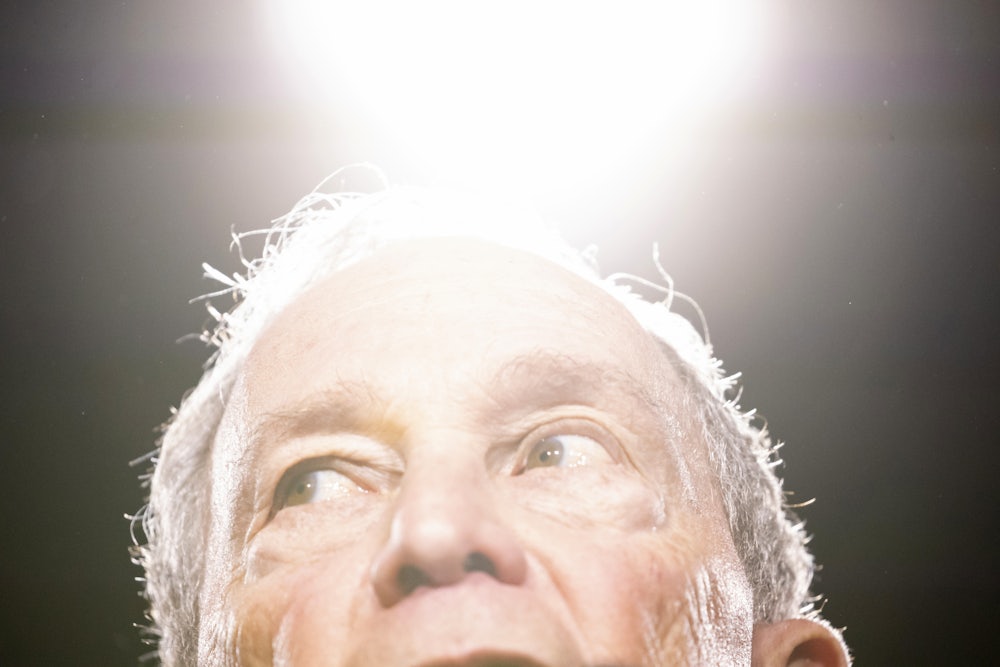Mike Bloomberg is a boss, and he’s got the hat to prove it. Ahead of the South Carolina primary, for which he will not be on the ballot, and the ensuing Super Tuesday elections, for which he will, Bloomberg has made his brand clear for voters: a rich man who gets shit done. (He is also not a socialist, according to the hat.)

The former mayor of New York City, rich even by billionaire standards, occasionally donates slivers of his inconceivably massive pile of money to decent politicians and causes. But his actual legacy is that of a politician and business owner who knows how to use his wealth to manipulate power and muddle media reporting. It’s stop and frisk and sweeping Muslim surveillance. It’s “Kill it,” and an untold number of nondisclosure agreements that insulate him from the consequences of his actions.
Before launching his presidential bid, Bloomberg used his wealth to sanitize this record, and it worked. He was welcomed at elite conferences about “ideas” and “innovation,” became chummy with the mayors whose cities and pet projects he helped fund, and made himself—out of a long history of sexism and racism—into something marketable. A boss. He was, as my former colleague Megan Greenwell wrote of this particular type, one of the people who “genuinely believe that they are rich because they are smart and that they are smart because they are rich, and that anyone less rich is by definition less smart.”
This was also Donald Trump’s schtick, which he rode from a crap show on NBC to the White House. Bloomberg is now hoping to do the same. There may be a slight difference in style, but the fundamentals are largely identical. And Bloomberg’s policies and the framing he has chosen to sell them with—that of wealthy white identity politics combined with his repetitive Never-Trump message—has, for this brief moment, worked again. He’s rapidly climbed in the polls, chewing away at the remaining electoral space Joe Biden currently clings to. He is able to do this, like any maligned boss, because he has the money to do so—but also because people like him designed the system to tilt in their direction.
It’s not just about his money, though—it’s also very much about his message. Bloomberg, in running out his costly wall-to-wall ad campaign, has attempted to sell his candidacy as a change from that of Trump. A return to normalcy. And he’s not entirely wrong. A Bloomberg presidency would be a return to American politics in which the upper crust of the white and financially secure could turn off their TVs and not have to worry about a commander in chief stumbling through sentences or constantly updating the world via social media about the latest Fox & Friends segment.
What Bloomberg promises is a sense of political seamlessness and technocratic efficiency that many liberals and moderates mistake for justice. That’s how it worked in New York City under his leadership—as Black and Latinx men and women were terrorized by police, as the number of people living outside swelled, and public housing crumbled, wealthy white New Yorkers largely saw order and tranquility. A mayor who knew how to get things done.
Under a Bloomberg administration, those same white moderates could rest easy knowing that their nation had returned to a previous sense of routine: merely bombing nondescript families and towns overseas; creating a humanitarian crisis at the border and funding others in foreign countries; underfunding communities of color; continuing to ostracize Native citizens, breaking treaties, and ignoring tribal sovereignty; and sprinting down the path to climate crisis. They just wouldn’t have to think about it so much because at least a real grownup was taking care of things.
What Bloomberg represents in actuality is the slim percentage of people who enjoyed America as it existed before Trump and those who believe that a man with money will be the solution to problems caused by other men with money. They want quiet. They want peace. Not for everyone, but for themselves. In Bloomberg, they can assuage their anxieties in a Boss-knows-best fealty and rest assured that he won’t entirely upend the system and the way Americans interact with politics. It’s a future that looks a lot like the past, and that’s entirely the point.
